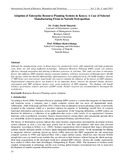| dc.contributor.author | Okelo-Odongo, William | |
| dc.contributor.author | Nzuki, David M | |
| dc.date.accessioned | 2015-06-14T11:15:44Z | |
| dc.date.available | 2015-06-14T11:15:44Z | |
| dc.date.issued | 2015 | |
| dc.identifier.citation | Nzuki, David Musyimi, and William Okelo-Odongo. "Adoption of Enterprise Resource Planning Systems in Kenya: A Case of Selected Manufacturing Firms in Nairobi Metropolitan." | en_US |
| dc.identifier.uri | http://hdl.handle.net/11295/84774 | |
| dc.description.abstract | Although the manufacturing sector in Kenya faces low productivity levels, stiff competition and high production
costs, firms are still using inefficient technology. Enterprise Resource Planning (ERP) system can enhance
efficiency through integration and sharing of business processes in real-time. This study was done to determine
factors that influence ERP adoption among corporate members of Kenya Association of Manufacturers (KAM)
that operate within the Nairobi Metropolitan. Questionnaires were administered to 141 KAM members whereas
17 ERP firms were interviewed. Logit model was used to estimate the influence of the factors on ERP adoption.
Organizational composite factor was found to be an important factor, whereas the planned change, business
environment and ERP attributes factors were weak predictors of ERP adoption. The findings will benefit
scholars, government, vendors and users of ERP system. Further research was recommended to investigate the
weak factors. | en_US |
| dc.language.iso | en | en_US |
| dc.publisher | University of Nairobi | en_US |
| dc.title | Adoption of Enterprise Resource Planning Systems in Kenya: A Case of Selected Manufacturing Firms in Nairobi Metropolitan | en_US |
| dc.type | Article | en_US |
| dc.type.material | en_US | en_US |

